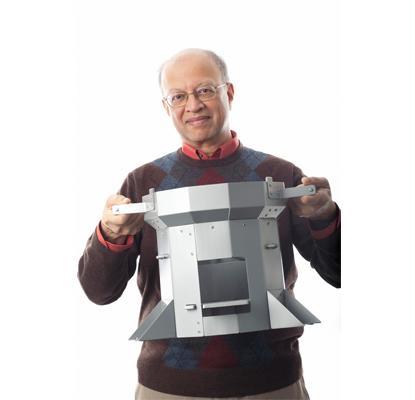Dr. Ashok Gadgil
Ashok Gadgil has demonstrated an unmatched drive and commitment to leverage his scientific expertise to benefit humankind. His on-the-ground innovations for sustainable development are made possible by his unwavering curiosity and unique blending of research, invention and humanitarianism. For his inventive accomplishments that are improving the livelihood of an estimated 100 million people in dozens of countries across four continents within the developing world, Gadgil is the recipient of the 2012 $100,000 Lemelson-MIT Award for Global Innovation.
Gadgil, who grew up in Mumbai, India was often exposed to how those in the bottom of the economic pyramid lived – regularly without electricity or clean, running water. Frequently working “after hours” on a shoe-string budget, and often with borrowed lab space and equipment, Gadgil pioneered solutions to address these issues of water safety, energy and fuel-efficiency. With an understanding of community challenges that he hopes to address despite severe resource limitations, Gadgil has translated his inventive ideas into affordable products and programs that are being successfully adopted in developing countries.
One of Gadgil’s noteworthy inventions is UV Waterworks. This effective and inexpensive technology utilizes ultraviolet light to purify water, eliminating disease-causing pathogens. The technology has been employed by WaterHealth International, Inc. and provides affordable safe drinking water to more than five million people in Ghana, India, Liberia, Nigeria and the Philippines, among many other countries, with plans for expansion to Bangladesh.
The Berkeley-Darfur Stove is another significant invention from Gadgil. This technology, disseminated by nonprofit Potential Energy (formerly The Darfur Stoves Project), is a fuel-efficient stove created to help reduce the fuel demand of displaced persons in Darfur, most of whom are women at risk of violence as they forage for firewood outside of camp boundaries. To date, 20,000 Berkeley-Darfur Stoves have been distributed, helping 125,000 women and their dependents. Gadgil is currently working on an iteration of the stove for Ethiopia.
A chair professor of Safe Water and Sanitation in the Department of Civil Environmental Engineering (CEE) at the University of California, Berkeley, Gadgil is not only a brilliant academic, but a talented and inspirational teacher. As a professor, advisor and mentor, Gadgil empowers his students to make a positive impact on society. For many years since 2001, he has taught relevant courses in CEE at the University of California, Berkeley. These include the graduate course “Design for Sustainable Communities,” and the seminar “Technology and Sustainability”; each examines technology’s impacts on society and its survival, leading many of his students to channel their potential towards socially responsible invention and innovation.
“There are three billion people in the developing world that can use help from the far fewer in the industrial world with an understanding of modern technology and science,” said Gadgil. “I tell my students, if you want to take on a problem, take on a problem of scale where if you are successful, you make a real impact.”
Gadgil also serves as the director of the Environmental Energy Technologies Division at Lawrence Berkeley National Laboratory and has been recognized regularly for his work in the developing world. He received the prestigious Heinz Award in 2009, was co-winner of the European Patent Office’s Non-European Inventor Award in 2011 for UV Waterworks, and won the Zayed Future Energy Prize for sustainable energy in early 2012.


